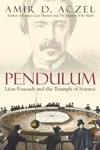Pendulum
Not a complete success.
In this account of Foucault's career, centered on his famous pendulum experiment, Aczel is consciously writing for an audience that is scientifically illiterate, and believes it is a very good thing indeed to be illiterate. Aczel has to to explain complex ideas that challenged the best mind of the scientific world in 1851, and to do this he allows himself no mathematics at all -- no diagrams, nothing but hand-waving.
A good deal of the book is cast as Foucault's struggle against academic credentialism and obscurantism. Foucault was a self-trained experimentalist who was not an accomplished -- perhaps not a competent -- mathematician. His peers and rivals considered his work insufficiently rigorous, and rushed to fill the void. Aczel naturally sympathizes with Foucault, but it's impossible to know from this cursory and prejudiced overview whether Foucault's critics were pettifoggers or merely wanted to insist on sound reasoning and proof.
The actual physics of Foucault's pendulum are simply too hard to work out with hand-waving. It's one thing to make accommodations for your reader's gaps in knowledge, but it's another thing entirely to assume that none of the readers will find a diagram comforting rather than alarming, and that all will run screaming from the room at the sight of an equation. Look at it this way: when we're discussing the Theater, we often feel free to allude to anything in Shakespeare. Has every college graduate read every line of Shakespeare? No: but we know we ought to have done, and we know how to look stuff up.
